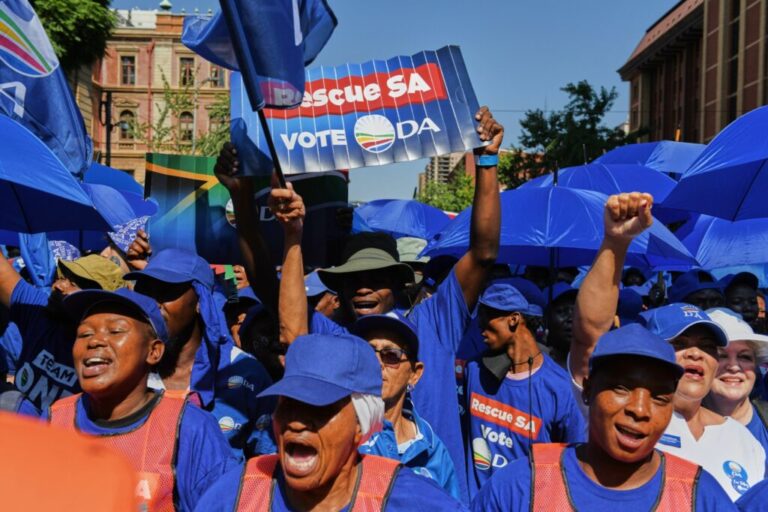The Democratic Alliance, South Africa’s main opposition party, predicted it can topple the African National Congress in this year’s election and said that it has a plan to end power cuts and turn the struggling economy around within five years if it does.
The DA intends to create 2 million jobs by 2029, expand the social safety net and introduce a fiscal rule to stabilise debt, its leader, John Steenhuisen, told thousands of supporters at a rally in the capital, Pretoria, on Saturday as the party unveiled its election manifesto.
ADVERTISEMENT
CONTINUE READING BELOW
South Africa’s election must take place by mid-August, with President Cyril Ramaphosa expected to announce the date next week.
“In every previous election since 1994, everyone knew that the ANC would win. The only question was by how much,” Steenhuisen said. “In this election, the DA is going to defeat the ANC. For the first time in our democratic history, support for the ANC is set to crash well below 50%.”
The ANC has governed since White-minority rule ended in South Africa three decades ago. Opinion polls show it has bled support and is likely to lose its majority in a backlash against its failure to tackle power cuts and rampant poverty and unemployment.
Steenhuisen has spearheaded the formation of a bloc of 11 opposition parties that aims to form a coalition government after the vote. Members of the Multi Party Charter have ruled out working with the ANC or the populist Economic Freedom Fighters, currently the third-biggest party, and polls show they’ll collectively struggle to obtain even 40% support. A survey by the Social Research Foundation indicates that an ANC-DA tie-up would be the one favoured by most South Africans.
Ending opposition infighting and consolidating like-minded parties into a cohesive bloc “offers voters the best prospect for political change since 1994,” Steenhuisen said.
The DA, which espouses market-friendly policies, currently controls the Western Cape — the only province not run by the ANC — and won 21% of the vote in the last national election in 2019. It has also wrested control of several major towns from the ANC in municipal elections by forming alliances with other parties, but those coalitions have proven unstable, with power changing hands several times and some services griding to a halt as a result.
The DA faced internal turmoil when Mmusi Maimane, its first Black leader, exited in 2019 and a number of its other senior Black members followed suit, with some of them taking issue with the DA’s policy on race. While the municipalities it controls are regarded as being among the country’s better-run, its top leadership is predominantly White and the party has struggled to increase its support among the country’s Black majority.
Among the policy proposals outlined in the DA’s manifesto are the scrapping of race-based economic redress — a cornerstone of ANC policy — and converting a temporary monthly stipend that was introduced to cushion the unemployed against the impact of the coronavirus pandemic into a permanent job seekers grant at an additional cost of R39.6 billion ($1.95 billion).
ADVERTISEMENT
CONTINUE READING BELOW
It also favors breaking the monopoly of state power utility Eskom, whose failure to adequately maintain its plants and invest in new generation capacity has led to years of rolling blackouts. The DA would instead increase investment in electricity transmission.
“The DA will get our public finances under control by stabilising public debt,” according to the party’s manifesto. “The DA will establish debt ceilings in the form of a fiscal rule to limit annual government borrowing, avoiding further debt crises.”
The DA’s other election pledges include:
- Achieving net-zero carbon emissions and reducing the impact of energy generation on the environment.
- Halving the rate of violent crime, including murder, attempted murder and gender-based violence.
- Lifting 6 million people out of poverty.
- Ensuring quality healthcare for all, irrespective of their economic status.
© 2024 Bloomberg

